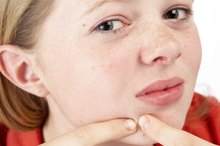What does fact checked mean?
At Healthfully, we strive to deliver objective content that is accurate and up-to-date. Our team periodically reviews articles in order to ensure content quality. The sources cited below consist of evidence from peer-reviewed journals, prominent medical organizations, academic associations, and government data.
The information contained on this site is for informational purposes only, and should not be used as a substitute for the advice of a professional health care provider. Please check with the appropriate physician regarding health questions and concerns. Although we strive to deliver accurate and up-to-date information, no guarantee to that effect is made.
Does Eating Potatoes Give You Acne?
The culprits behind your acne blemishes are hormones, oily skin, dead skin cells, clogged pores, bacteria and inflammation. So, although eating potatoes doesn't give you acne, in some people it may exacerbate a few of the causes. Just as there isn't only one cause of acne, there also isn't one treatment. In other words, don't rely on eliminating potatoes from your diet to banish your blemishes 1.
Potatoes and Insulin
The Western diet, which is often rich in carbohydrates, boosts levels of the hormone insulin. Potatoes have an effect similar to pure sugar on your blood glucose levels and are particularly bad for your insulin levels. In addition, insulin has several adverse effects on acne. It increases oiliness in your skin and boosts inflammation of the skin, which makes acne worse.
- The Western diet, which is often rich in carbohydrates, boosts levels of the hormone insulin.
- Potatoes have an effect similar to pure sugar on your blood glucose levels and are particularly bad for your insulin levels.
Potatoes and Weight Gain
Are Carrots Good for Acne?
Learn More
Being overweight or obese makes you more likely to have conditions such as insulin resistance, metabolic syndrome or type 2 diabetes. One common feature of these conditions is high insulin levels. If you're already battling excess insulin, consuming high-glycemic foods such as potatoes can make it worse and might also make managing your acne even more difficult.
- Being overweight or obese makes you more likely to have conditions such as insulin resistance, metabolic syndrome or type 2 diabetes.
- If you're already battling excess insulin, consuming high-glycemic foods such as potatoes can make it worse and might also make managing your acne even more difficult.
Evidence
In a study published in the "American Journal of Clinical Nutrition" in July 2007, researchers investigated the effects of consuming a low-glycemic-load diet in 43 male patients with acne between ages 15 and 25. They found that the diet helped to improve the participants' insulin sensitivity and reduce their weight. It also resulted in fewer acne lesions than the control group.
Recommendations
Are Brown Rice and Sweet Potatoes Good for Acne?
Learn More
Cutting potatoes out of your diet won't likely cause any nutritional problems and might improve your acne. You can get your daily supply of carbohydrates from whole-grain foods, fruits and vegetables -- foods that are healthier for your skin. However, if you can't kick your potato habit, try eating it with the skin, which is packed with fiber -- a nutrient that helps to keep blood glucose levels stable. If you are on a special diet or have a medical condition, consult your doctor before changing your diet to treat acne.
- Cutting potatoes out of your diet won't likely cause any nutritional problems and might improve your acne.
- You can get your daily supply of carbohydrates from whole-grain foods, fruits and vegetables -- foods that are healthier for your skin.
Related Articles
References
- DrBiffa: Why the Potato is One Vegetable It Makes Sense to Keep a Lid on in the Diet
- "Prescription for Drug Alternatives"; James F. Balch, M.D., et al.; 2008
- Zeichner JA, Baldwin HE, Cook-bolden FE, Eichenfield LF, Fallon-friedlander S, Rodriguez DA. Emerging Issues in Adult Female Acne. J Clin Aesthet Dermatol. 2017;10(1):37-46. PMID:28210380
- Gollnick HP, Zouboulis CC. Not all acne is acne vulgaris. Dtsch Arztebl Int. 2014;111(17):301-12. https://doi.org/10.3238/arztebl.2014.0301
- Tanghetti EA. The role of inflammation in the pathology of acne. J Clin Aesthet Dermatol. 2013;6(9):27-35. PMID:24062871
- Elsaie ML. Hormonal treatment of acne vulgaris: an update. Clin Cosmet Investig Dermatol. 2016;9:241-8. https://doi.org/10.2147/CCID.S114830
- Questions and Answers About Acne. National Institute of Arthritis and Musculoskeletal and Skin Diseases (NIAMS). Jan 2016. National Institutes of Health.
- Zaenglein AL, Pathy AL, Schlosser BJ, Alikhan A, Baldwin HE, et. al. Guidelines of Care for the Management of Acne Vulgaris. Journal of the American Academy of Dermatology 74.5 (2016): 945-73. doi:10.1016/j.jaad.2015.12.037
Writer Bio
Kay Uzoma has been writing professionally since 1999. Her work has appeared in "Reader’s Digest," "Balance," pharmaceutical and natural health newsletters and on websites such as QualityHealth.com. She is a former editor for a national Canadian magazine and holds a Bachelor of Arts in political science from York University.









